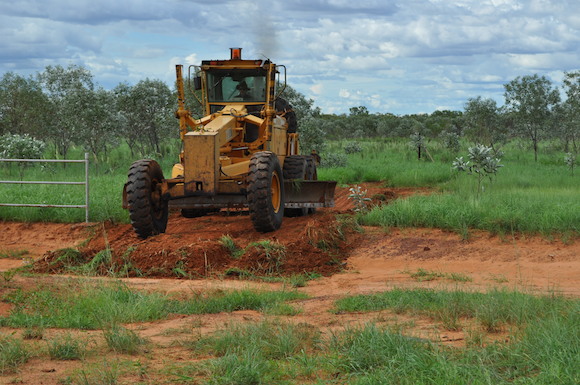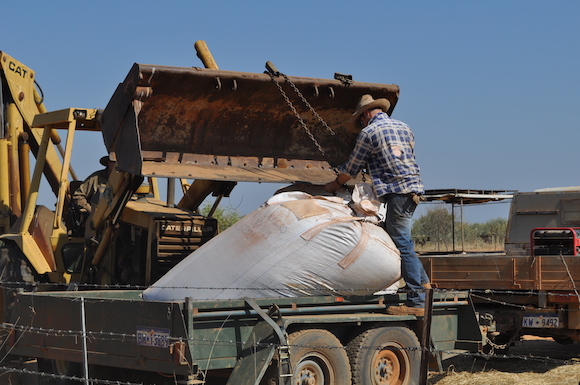So you want to be a ringer?
Host: Dampier Downs Station
Written by Anne Marie Huey – Manager, Dampier Downs Station.
You’ve heard about the big horizons, the scrub bulls, the good horses, and all the adventure of living and working on a remote cattle station. You’ve got the Wranglers, the boots, and the ute and you’ve decided to head north to give ringing a go. Good decision – one of the best ways to experience all the north has to offer is to get amongst it on a cattle station.
However, before you roll your swag and dust off the Akubra there are a few things you should know. Being a ringer is not for the faint-hearted. The days are long, the work is physically demanding and the pay – when compared to the mining sector at least – is not great. You will be hot, dirty, uncomfortable, and at times find yourself doing things you really don’t want to do.
 It’s a dirty job . . . after a morning’s preg testing.
It’s a dirty job . . . after a morning’s preg testing.
So why would anyone want to work on a cattle station? I can think of a few good reasons.
People are one of the most valuable resources on a cattle station. When you are managing a large area and are reasonably remote, you need to know that you can rely on your staff to get the job done even if they are at the opposite end of the property. Good staff make all the difference between a well-run, efficient business that is an enjoyable place to work and a time-consuming, energy-draining exercise in frustration that is akin to mustering cats.
Over the years, we’ve had all sorts at Dampier Downs. I could probably write a book about some of the more dubious characters that have come and gone, and in the last twelve months we have probably had the worst we’ve ever seen. Of course, we have also had some brilliant staff, many of whom have made a lasting contribution to our business (and right now we have a great crew).
One of the best things about the pastoral industry is that most employers are willing to give you a go, even if you don’t have all the necessary skills at the start. Skills can be taught, but it is essential to have the right attitude. Some of our best workers in recent times have been a lawyer, a classically trained trumpet player, and a fashion designer. Despite having little to no experience when they started, by the time they left they were driving trucks, welding end assemblies, servicing motors, and operating machinery. These are skills they will have forever and will stand them in good stead wherever they go in life.
 Depending on aptitude and attitude, driving a grader could be one of your many new skills.
Depending on aptitude and attitude, driving a grader could be one of your many new skills.
So what are the qualities that make a good ringer? Here are my top five tips:
- Take pride in a job well done
It is inevitable that some days you will find yourself doing jobs you would really rather not be doing. That’s unfortunate, but the reality is those jobs are just as vital to the running of a successful cattle business as the actual cattle work. So, if you find yourself cleaning troughs, digging holes, or cementing posts the only thing to do is get on with it and do the best job possible. Chances are the job will be there years – or even decades – after you have moved on. Do it badly and the boss will offer a silent curse every time he drives past that crooked post, but do it well and it will be a lasting testament to your hard work and ability.
- Show initiative and be willing to learn
No-one can predict every possible scenario that may occur. Being a ringer is about keeping your eyes open and your wits about you. If you see a potential problem, don’t just drive off and hope the next person to come along will fix it, see what you can do about it yourself. If you don’t know how to do something – ask! You’ll rarely get into trouble for asking questions, but going off half-cocked can end in disaster.
And even if you have experience under your belt, appreciate that there are many ways to do a job. Be open to new ideas and, just as importantly, if you think you can see a better way of getting the job done, offer suggestions. However, it might be wise to pick your moment. Down at the yards, when the uninvited tourist has just turned up with a fluffy city dog, that has just latched on to an old scrub bull, that has just knocked out the newbie backpacker, on his way to taking out the portable panels, and therefore spilling the entire mob, is probably not the best time to discuss the finer points of yard design.
- Work hard
It is important to understand that the only way the boss can afford to pay your wages is if you are out there making money every single day. This might sound a bit mercenary but it is a fact of life. Margins are tight in the cattle industry and if you’re not making the business money you are costing the business money, and nobody can afford that. Bludging, shirking, and doing a half-hearted job are sure-fire ways to find yourself at the top of the ‘do-not-employ’ list (and believe me, that list travels).
- Loyalty
At the end of the day, wherever you find yourself, you have chosen to work on a particular cattle station. At the end of the fortnight, you also receive a healthy deposit in your bank account. For that reason alone your boss deserves your loyalty. Of course, if you’re truly unhappy working where you are you can always leave. Done the right way (with sufficient notice and not leaving the rest of the crew in the lurch), no-one will begrudge you moving on if it is just not working out. Bitching, moaning, and constantly complaining, however, is a whole different story. Among the camp it can lead to seriously eroded morale and you will probably end up with a reputation as a whinger. Done off-station, it marks you as the sort of person who would rather complain about a problem than fix it, a serious red flag to potential future employers.
- Maintain a sense of humour
You’ll need it. Chances are you’ll find yourself far from home, living and working with a diverse bunch of people – some of whom you would probably not associate with normally. This doesn’t have to be a bad thing. Look at it as a way to increase your circle of friends or, at the very least, an opportunity to gain an insight into different ways of life. You’ll also need tolerance, patience (note to self), and the ability to move on from disputes without bearing a grudge. When everyone works together there can be great camaraderie within the camp, and that can make even the dirtiest jobs that much more enjoyable.
 Feeding out supplement – one of the many jobs that need to be done.
Feeding out supplement – one of the many jobs that need to be done.
In summary, if you’re a clock-watching, self-serving, blame-laying wannabe who thinks the boss is only there to provide you with a lifestyle, being a ringer is probably not for you. However, if you’re willing to give it a go, prepared to do the hard yards to get the rewards, and are keen learn the business from the ground up, it could be the start of a whole new adventure.
And the pay-off is really rewarding. There is a real sense of freedom in the Australian bush. You get really comfortable in your own skin and a real sense of self. You might have to learn the hard way (most of us do), but by the end of the season you will have a really good idea as to what you really can achieve.
Spectacular sunsets, glorious sunrises, and stars so big and clear you would swear you could almost touch them are there to be savoured. New skills, new abilities, and bragging rights over your ‘soft’ mates in the city are all there for the taking. And, of course, you will go to bed each night knowing what you did during the day really mattered. You’re feeding the world, and that’s something of which to be genuinely proud.
